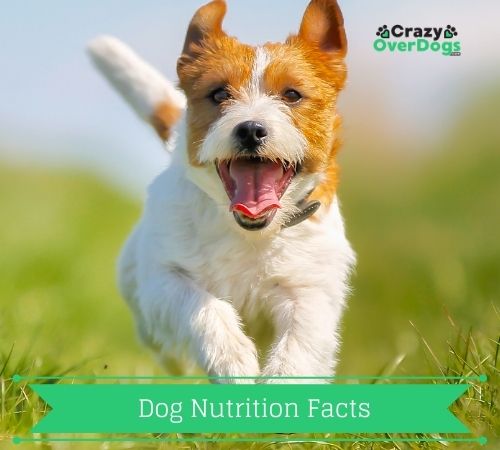What are the important dog nutrition facts for better health that you should know? A critical factor in your dog’s overall health is a well-balanced diet. It also helps to ensure good growth. If there are no special needs or deficiencies which have been highlighted by your vet, then good quality food should give the nutrition which your dog will require.
The content takes around 9 minutes to read, but if you are in a hurry, we have also included a table of contents below so you can see at a glance what the content is.
Make sure to check out today’s deals to SAVE money on dog products by clicking on the graphic below. Don’t miss out.
This post contains affiliate links and I will be compensated if you make a purchase after clicking on my links.
——————————-
A growing problem, much as the same for us humans, is the obesity factor. Thus, it’s essential to have the correct dog nutrition facts available, in order to make the right decisions for the health of your dog.
Please read below the requirements which your dog will need at various stages in its life.
Table Of Contents
Video On Dog Nutrition Facts:
—————————
What Are Nutrients For Your Dog:
They are the substances that your dog gets from the food it digests. Nutrients are essential because your pet derives its energy from them and they also help in the growth and proper maintenance of its body. For optimum quality of life, there are six essential types of vitamins required especially as your dog gets older.
1). Proteins:
Every pet owner should know that their pet relies on certain kinds of proteins to help maintain its health. If proteins aren’t found in your dog’s diet, then they can suffer from serious health conditions.
In order to ensure your dog has a balanced and nutritious diet, you need to know the different kinds of proteins that are important to your pet and find ways to include those proteins in their daily meal plan.

Not every dog will require the same types of proteins, so you need to find the best sources of protein, which you can include in their diet for the best benefits for your dog.
While some dogs may need more protein than others, there are a number of sources of protein that can be used as a great addition to any dog’s daily meal plan.
There are a number of foods that can help pets meet their dietary needs for proteins and other nutrients, including poultry products, beans, fish, beef, dairy, nuts, vegetables, fruits, eggs, and seeds. Although a vegetarian diet can provide benefits for dogs, it is important to remember that it isn’t a magic bullet.
Just as humans must supplement their diets with vitamins and minerals to stay healthy, so do dogs. In order to keep your dog healthy and strong, it’s important to keep his nutrient intake consistent with the correct dog nutrition facts. By paying attention to the ingredients in the foods you choose to feed him, you’ll be able to make sure he has the right balance of nutrients to keep him energetic and healthy.
————————–
2). Water:

This is essential to life for both humans and pets. I think that we tend to underestimate its importance. It accounts for between 65% to 70% of the body weight of the dog.
Therefore, a lack of water can manifest serious health issues for your pet. It is therefore so important that you provide your dog with an adequate amount of water. Water is very essential for the purification process of our body as it helps to remove the toxins that can affect the system negatively.
——————————–
3). Carbohydrates:
One of the best benefits for dogs is having good health. Carbohydrates provide energy, which keeps the body functioning well, especially if you feed your pet with quality pet food. This means that the more carbohydrates you feed your dog, the more healthy carbohydrates he should receive, thus, preventing weight gain, one of the major problems associated with pets.

Many dogs suffer from diabetes or hyperglycemia because of abnormal blood sugar levels, which can result from food allergies or from excessive consumption of grains rich in sugar.
If your dog suffers from these health issues, you should give him healthy carbohydrates instead of grain-based foods because these can aggravate his condition.
Besides providing energy, carbohydrates can also be beneficial to maintaining a healthy body weight. A healthy diet provides a balanced combination of all nutrients, which includes proteins, vitamins, minerals, and fiber.
Carbohydrates are an essential component for the health of vital organs, such as the brain and the intestine. They provide the necessary intake of glucose, which is needed for the supply of energy to keep the body working.
———————————————–
4) Fats:
Some people think that any kind of fat is bad for your pet, but this is incorrect. The fats are needed to help in the absorption of vitamins plus are also essential in the vital structure of cells.
They also provide protection and insulate vital organs within the body. Indeed where your pet has a deficiency of fatty acids, this can result in skin problems, and also growth can be reduced.
Dogs, just like humans, need fats to sustain the body’s internal functions and to perform its functions. The types of fat that dogs should not eat include saturated fats (such as those found in meats and dairy products), trans fats (such as those found in margarine and other processed foods), and unsaturated fats (such as those found in fish and nuts).
The Importance of Diet:
Although a dog’s diet can contain a variety of fats, the number of calories in his diet and the type of fat in his diet matter most to him. Dogs that receive a high percentage of their calories from fat are less likely to become overweight or obese and develop certain kinds of cancer.
Diets that provide a high intake of calories but a low intake of nutrients, such as fiber and protein, are believed to encourage overeating and obesity. A high-fat, low-nutrient diet is believed to promote polyunsaturated fats, which are thought to reduce the risk of heart disease and certain cancers.
—————————
5). Minerals:
Dogs need different kinds of minerals to help them with their bones, teeth, coat, skin, and digestive systems. For example, they need a lot of calcium if they’re going to grow properly.
So what kind of minerals are good ones to give your dog? Well, there are actually two types of minerals; trace minerals and macro miners. You should get more of the trace minerals in your dog’s food than the macro miners.

They are vital for the body’s function, even though they make up only around 0.7% of the body. They are grouped into two main categories, called macro, and micro. Some of the macro minerals are calcium, magnesium, and sodium. Copper, iron, and zinc fall within the micro categories.
The trace minerals would include such minerals as pantothenic acid, anserine, thiamin, and thioctic acid. They also include vitamin E, lysine, and magnesium. However, you shouldn’t give your dog too much vitamin E or it could cause diarrhea.
Macrominerals on the other hand contain magnesium, sodium, phosphorus, potassium, and silica. These are all important minerals for dogs. So you should give your dog food that has more of these minerals than the macro miners.
————————–
6). Vitamins:
Did you know that vitamins are important to your dog? In fact, your dog needs all eight of the vitamins required for the human body. Therefore a good diet is important to the health of your pet. However, many owners do not make a habit of giving their pets the nutrients they need. This is especially true for older dogs that may not be getting the required vitamins needed, due to a change in their diets over the years.
When looking at the types of dog vitamins you should purchase, you need to focus on one important category – minerals. These include such things as phosphorus, magnesium, copper, iodine, manganese, zinc, and calcium.
Your dog’s body will absorb some of these vitamins, but the best ones will be found in supplements. Calcium and iodine are particularly important for ensuring proper bone growth and development.
FAQs:
——————————-
——————————-
———————————————–
We do hope that the information has informed you of the important dog nutrition facts that you should know. Above brings health benefits to your dog, which in turn will benefit your own life in a positive way.
——————————–
Related Articles:
Best Dog Food For Sensitive Stomachs
———————
Disclaimer: All material on this website is provided for your information only and may not be construed as medical advice. No action or inaction should be taken based solely on the contents of this information; instead, readers should consult appropriate health professionals or veterinarians on any matter relating to their dog’s health and well-being. The publisher is not responsible for errors or omissions.
This presentation contains images that were used under a Creative Commons License.
Estimated reading time: 10 minutes




This is a very important topic which many dog owners do not take seriously enough. Far too many dogs just get fed on leftovers from their owners food and as a result are not getting the vitamins and minerals that they need.
Taking dogs on long walks on hot days and not having water for them is next to cruel.
This is very good information. I just hope that lots of dog owners read it.
Keep up the good work.
Geoff
Thank you for your kind comments. I totally agree with ” Taking dogs on long walks on hot days and not having water for them is next to cruel.”
Dave
Overweight dogs are usually the result of owners that feed their dogs too much food. They certainly need a well balanced diet with all the right nutrients, and most dogfood brands do provide that for pets. The problem often starts when the dog is fed the normal dogfood, and then gets scraps and leftover food, that might just lead to them overeating.
By all means, give your dogs the treats they deserve, we have always done that, but balance it with the nutritional requirements and make sure your pet gets all the nutrients, without overfeeding them.
LineCowley
As with us humans, obesity is also a major problem with our dogs. You make a great point in – ” The problem often starts when the dog is fed the normal dogfood, and then gets scraps and leftover food, that might just lead to them overeating. “
We owe it to our pets to be responsible and give them a proper diet combined with the necessary exercise. Both owners and dogs benefit so much.
Dave
Good day, I’m pleased to come across this important information. Well, I have always thought that dogs do need good food too, to be healthy and strong. But I never thought that they would need such to an extend of vitamins, minerals or fats. This is a very helpful piece of writing. I think from now on, I will raise my dogs the best possible way, in terms of their diet. Thank you.
Kokontala
Like us dog owners, our pets sometimes need supplements and vitamins to give us a boost for our overall health.
Dave